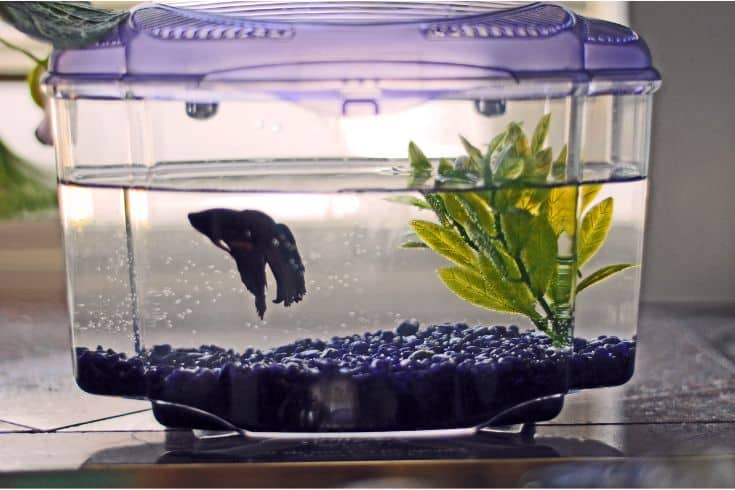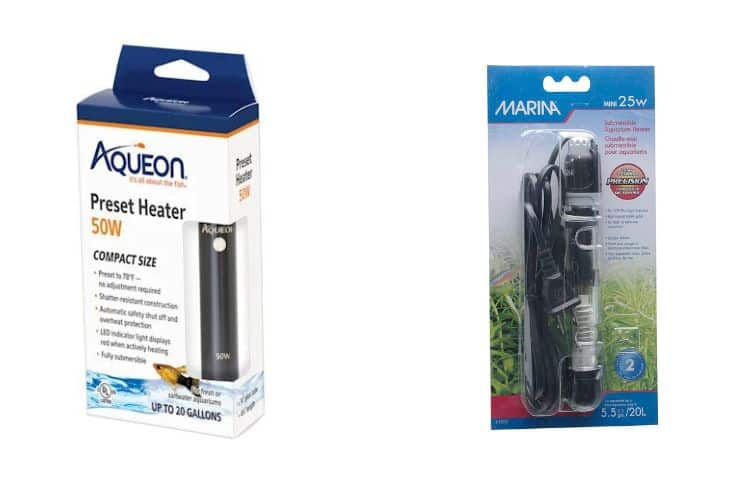Betta fish are universally popular, thanks to their brilliant colors, flowing finnage, and quirky personalities. These beginner-friendly ornamental fish come from the tropical waters of Southeast Asia, where the climate is humid and warm all year around.
But do betta fish need a heater if you live in a warm climate? How warm should a betta tank be? Can a betta fish live without a heater?
So, your betta fish needs to live in an environment where the water temperature is constantly around 76 degrees Fahrenheit or above. For that reason, your betta fish needs a heater in his tank.
Read this guide to learn more about why betta fish need a heater, together with information on how to choose the right one for your betta tank, how to keep betta fish warm, and more!
Ideal Temperature Range For Betta Fish
Though fish may be cold-blooded animals, many species require a specific temperature range in order to thrive. The optimal temperature for tropical fish like bettas typically hovers between 76-82 degrees Fahrenheit. In the wild, bettas live in stagnant rice paddies with very little circulation. This lack of movement means that the water doesn’t cool down as quickly at night, thus explaining these fish’s narrow ideal range of temperatures.
While bettas can technically survive in aquarium water that falls outside this optimal range, it’s important to remember that these fish already live in a stressful environment. The last thing you want to do is add to that stress by subjecting them to water that’s too cold or too hot. Maintaining a consistent, correct temperature in your tank will help to reduce stress levels and keep your betta healthy.
Why Do Betta Fish Need A Heater?
Although we’ve touched on it briefly, it’s worth delving a bit deeper into why bettas need a heater in their tank. Here are a few things heaters do for your pet bettas:
Mimics Natural Environment
Most bettas in the aquarium trade look like a completely different fish species compared to their wild counterparts. However, the fact that these colorful fish have been selectively bred for generations does not change the fact that they still require a tropical climate. This means that their bodies are not equipped to deal with tank water that’s too cold.

A heater helps create a more natural environment for your betta by raising the water temperature to a level closer to their ideal range. A tank environment replicating their natural habitat as closely as possible will help reduce stress levels and keep your betta healthy. This is why seasoned aquarists typically recommend that beginner fishkeepers start with a heater in their tank, even if they don’t have a betta.
Of course, maintaining the right temperature for bettas isn’t the only thing you need to do to keep them healthy, but keeping your water quality in check is an essential part of providing proper care.
Minimizes Temperature Fluctuations
Heaters do more than just turn cold water into hot water; they also help to stabilize the temperature in your tank. This is important because maintaining a consistent temperature in aquariums can be difficult, even if you reside in a tropical environment yourself. Over the course of the day, tank temperature can fluctuate due to a number of factors, including the position of your tank in relation to the sun and the temperature of your home.
The lack of stable temperatures in a betta’s tank can lead to stress and a host of other health problems, so it’s important to do everything you can to minimize temperature fluctuations. A heater is one of the best ways to achieve this. A heater with a reliable temperature setting will maintain a consistent water temperature, no matter what the temperature is like in your home. These heaters come with a thermometer so that you can always check and adjust the temperature as needed.
Once you’ve set the temperature on your heater, it will work to keep the water at that constant temperature until you adjust it again. This means you don’t have to worry about temperature fluctuations stressing your betta or making them sick. Not bad for a little piece of equipment, huh?
Achieves Optimal Breeding Conditions
Betta breeding is a complex process, and a variety of factors need to be taken into account to achieve success. One of the most important things you need to do is provide your bettas with the optimal water temperature for breeding. Otherwise, you may not get the results you’re hoping for.
The ideal water temperature for breeding bettas is between 78 and 82 degrees Fahrenheit. This may seem warm to us, but it’s actually the perfect temperature for bettas to breed. If the water is too cold, the bettas may not be able to produce offspring. If the water is too hot, the eggs may not be viable. A heater is the best way to maintain a consistent water temperature in your tank, and it’s essential if you want to breed bettas successfully.
There are a variety of reasons why you might want to breed bettas, including showing them off at competitions or selling them to other hobbyists. Whatever your reasons, it’s important to do everything you can to set your bettas up for success. Providing them with the optimal water temperature is one of the most important things you can do, and a heater is the best way to achieve this.
Improves Digestion and Overall Health
Did you know that the warm water provided by a heater can also help to improve your betta’s digestion and overall health? Bettas are cold-blooded animals, which means that their metabolism is directly affected by the temperature of their environment. In cooler water, their metabolism slows down, leading to indigestion and other health problems.
Warm water helps to speed up their metabolism, which in turn improves digestion and overall health. A heater is the best way to maintain a warm water temperature in your tank, and it’s especially important if you live in a cooler climate. If you want your betta to be as healthy as possible, providing them with a warm environment is essential.
I remember one time when the heater unit in my betta tank failed during the night. I didn’t notice anything was wrong until my betta lost interest in his food and didn’t bother patrolling his tank, both of which were not typical behaviors for my fish.
At first, I wondered if my pet was sick, but I couldn’t see any physical injuries or other problems, such as white spots, red skin patches, etc. I had only owned my betta buddy for a couple of months, so I knew he wasn’t suffering from old age.
So, I tested the tank water parameters, all of which were fine and well within the ideal range for bettas until I got to the water temperature. To my horror, I discovered that the heater had malfunctioned, and the water was just about at room temperature, which was nowhere near as warm as it should be for bettas.
Fortunately, I was able to hot-foot it to my local aquarium store to replace the heater, and after a few hours, my betta began to recover.
Prevents Disease and Illnesses

You’ve learned that heaters keep your betta warm and help to minimize temperature fluctuations, but did you know that they can also help to prevent disease and illness? Cooler temperatures are often to blame for various betta illnesses, including velvet disease, bacterial infections, and gill flukes. These diseases can wreak havoc on your betta’s health, so it’s important to do everything you can to keep your pet in optimal health.
Maintaining a relatively warm temperature in your tank is one of the best ways to prevent these diseases from taking hold. Bettas cannot regulate their body temperature, so it’s up to you to provide them with the warm water they need to stay healthy. A heater is the best way to do this, especially if you live in a cooler climate. Many factors go into keeping a betta healthy, but providing them with a warm environment is one of the most important things you can do.
As you can see, there are a variety of reasons why you might want to consider investing in a heater for your betta fish. Whether you’re looking to improve their health, breeding conditions, or provide a more comfortable environment, a heater is a great and important addition to any betta tank.
Choosing The Right Heater
Now that we’ve established that bettas need heaters to stay healthy, it’s time to talk about choosing the right heater for your tank. This may seem daunting, but it’s not that difficult once you know what to look for. Here are a few things to keep in mind when choosing a heater for your betta:
Tank Size

The first thing you need to consider when choosing a heater is the size of your tank. Proper heating begins with choosing a heater that is the right size for your tank. If you have a small tank, you’ll need a small heater. Conversely, you’ll need a larger heater if you have a larger tank. Bettas typically require 5 watts of power for every gallon of water in their tank. This means that a 10-gallon tank will require a 50-watt heater, while a 20-gallon tank will require a 100-watt heater.
Watts per gallon is a good general rule to follow, but it’s not the only thing you need to consider. You also need to make sure that your heater can adequately heat the entire tank. This means you must choose a heater that is the right size for your tank and can evenly distribute heat throughout the entire tank. When heat is localized in one area, it can lead to hot spots and uneven temperatures. This can stress out your betta and make them more susceptible to illness.
Heater Type
In general, there are 6 main types of heaters: submersible, hanging, substrate, in-line, in-filter, and in-sump heaters. The most common type of heater used in a betta tank is a submersible heater, though fishkeepers can and do opt for other types of heaters depending on their needs. Check out this article if you want a clearer idea of what each heater type looks like and whether it is appropriate for your fish tank.
The type of heater you choose will largely depend on the size and setup of your tank. For example, a heating mat or heating pad might be a good choice for a small tank that can’t accommodate a larger submersible heater. On the other hand, a submersible heater featuring a glass tube and suction cups is a good choice for most betta tanks. A popular option is the Tetra HT10 50-Watt Submersible Heater, an amazing heater that can be used in various tank setups.
Thermostat Integration
Not all heaters come equipped with a thermostat, but it’s definitely something you should look for when choosing a quality heater for your betta. A thermostat ensures that your heater will automatically turn off once the water in your tank reaches the desired temperature. This is important because it prevents your betta’s water from getting too hot, which can be just as dangerous as having too cold water.

The Fluval Marina Submersible Mini Heater is a good example of a heater with thermostat integration. This adjustable heater can be set to a wide range of temperatures, making it perfect for betta tanks. If you only intend to use your heater to maintain one specific temperature reading, you can also find heaters with preset thermostats. For example, the Aqueon Preset Aquarium Heater shuts off automatically when it reaches 78 degrees Fahrenheit, making it a good choice for betta tanks.
Safety Features
When choosing a heater, it’s important to make sure that it comes with a few key safety features. Cheap betta heaters may seem appealing, but they often lack important safety features that can protect your betta from harm. After all, if cost were the only concern, we’d all light a bunch of tea lights and call it a day. Instead, you’d find even the most budget-conscious fishkeepers opting for quality heaters with built-in safety features, such as automatic shut-offs and thermal fuses.
The main reason why safety features matter is because they dramatically lower the chances of temperature shock. This is when your betta’s water temperature changes too quickly, which can stress them out and make them more susceptible to illness. A good heater will also ensure that the actual water temperature in your tank is the same as the temperature you set it to. This is vital for maintaining a stable and consistent environment for your betta.
Can You Get Away Without a Heater?
Though we’ve established that bettas generally need a heater to thrive, you might be able to get away without using a heater in your betta tank if your home is warm enough. This applies to people who live in warm climates or heat their homes to a warm and toasty temperature year-round. This makes sense when you think about it – if your betta tank’s external environment is already warm, your betta’s water will slowly start to heat up as well.
If you think you can get away without using a heater, start by testing the temperature of your betta’s water using an accurate aquarium thermometer. If the water is already between 78 and 80 degrees Fahrenheit, you’re in good shape, and likely won’t need a heater. However, if the temperature is any lower than 78 degrees, you’ll need to invest in a heater to ensure that your betta stays warm enough.
Another factor to consider is that this isn’t a fail-proof method, and there’s always a chance that the temperature in your home (and betta tank) will drop unexpectedly. If temperature fluctuations are common in your home, it’s best to avoid caution and use a heater. This is especially true during winter months, when ambient temperatures can be harsh and unpredictable.
Do Betta Fish Need a Heater? – The Takeaway
In short, yes – bettas generally need a heater to thrive. A good heater will maintain a consistent water temperature in your betta tank, preventing large and sudden temperature changes that can stress your fish out. Heaters also come with a few key safety features, such as automatic shut-offs and thermal fuses, which can help to protect your betta from harm.
If you live in a warm climate or heat your home to a warm temperature year-round, you might be able to get away without using a heater. However, you will need to be vigilant about monitoring the temperature of your betta’s water, as sudden temperature changes can still occur. A good, reliable thermometer is a must in this case.
Ultimately, whether or not you need to use a heater in your betta tank is up to you. If you’re not sure, err on the side of caution and use a heater to ensure that your betta stays happy and healthy. And if you have any questions about whether or not your betta needs a heater, be sure to ask your local fish store or pet retailer for advice. They’ll be more than happy to help you figure out what’s best for your betta fish. Thanks for reading!
